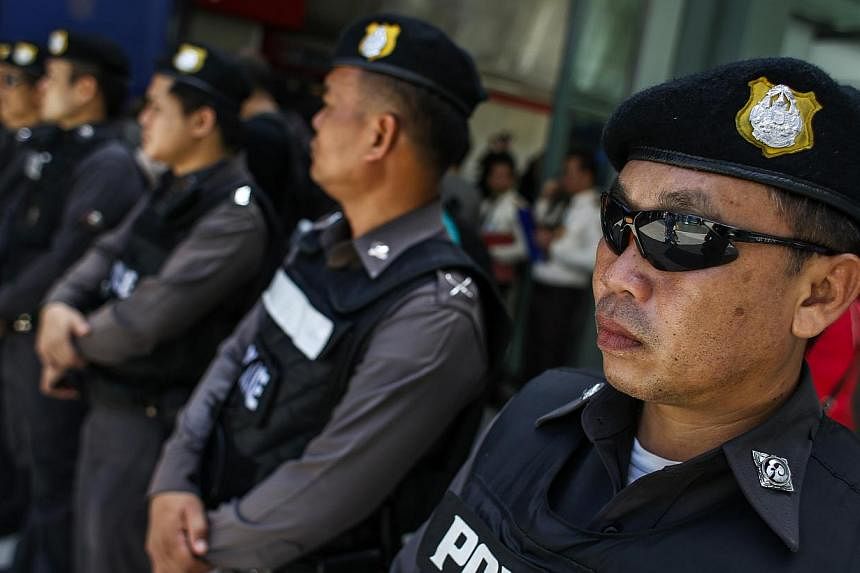BANGKOK (REUTERS) - As Thailand's junta tries to pull the economy back from the verge of recession, the generals have a significant advantage over the government they ousted - the country's banks are prepared to lend them money, and cheaply too.
When the military government tendered for a 50 billion baht (S$1.9 billion) loan this month to help pay money owed to rice farmers, 12 banks offered a total of 145 billion baht.
The state-run Government Savings Bank (GSB) won the tender, lending for three years at a rate of 2.1792 per cent, much lower than a yield of 2.45 per cent on three-year government bonds.
In contrast, commercial banks and even state banks had been reluctant to lend to the government of Yingluck Shinawatra after it was put in caretaker mode in December.
"Previously, there was a problem of legality, whether the Finance Ministry would be able to guarantee loans under a caretaker government," said Amnuay Preemonwong, a board member of the GSB. "But that's not an issue now as the current government has full powers. It's not only the GSB, other banks are more confident about bidding. Everybody will dare lend now." Indeed, in February a rush of withdrawals by customers saw the GSB scrap a 5 billion baht loan that could have been used to prop up the then-government's controversial rice-buying scheme, and the bank's president resigned.
Also in February, state-owned Krung Thai Bank Pcl said it would not offer loans for the government's rice-buying scheme, mainly due to legal risks. On Thursday the Finance Ministry will put a 40 billion baht loan up for tender, and the Amnuay said the GSB board had approved bidding for the whole amount.
When the government was in caretaker mode, it had limited powers to raise and spend money. Efforts to raise cash to pay rice farmers under a state subsidy scheme had little success, even after the administration tried to persuade local government bodies to deposit money with the fund.
AMPLE DOMESTIC FUNDING
The May 22 overthrow of Yingluck's government followed seven months of political paralysis that had disrupted budget spending, undermined confidence and caused the economy to contract 2.1 per cent in the first quarter.
Since suspending democracy indefinitely, the army has moved to push ahead with public spending and drafting a budget for the tax year beginning October, restoring confidence for business.
"In general, it seems to me that the local business community just wants to have some certainty and the coup might have provided some hopes that there will be, at least in the near term," said Gundy Cahyadi, an economist with DBS Bank in Singapore. "But it is important to watch when fresh elections will be held." The coup has drawn international criticism, but low national debt and flush domestic savings mean the military can easily fund its spending plans without having to go offshore. "The costs of domestic and foreign borrowings are not much different, so we can do it here as liquidity is ample. We are just waiting for projects to be implemented before proceeding,"said Suwit Rojanawanich, an adviser to the Finance Ministry's public debt management office.
The banking sector had about 2.3 trillion baht of liquidity available at the end of March, with deposits at banks standing at 10.5 trillion baht.
Moody's Investors Service affirmed its Baa1 rating for Thai government debt on June 2, having been initially bearish on the impact of the coup on the country's debt rating. "Fiscal rules are still standing, even though the constitution is suspended. We expect there will be fiscal discipline," Steffen Dyck, Moody's sovereign analyst for Thailand, told Reuters.
The military government has approved a budget deficit of 250 billion baht for 2014/15 - unchanged from the current year and including 450 billion baht for investment.
That deficit is equivalent to about 2 per cent of gross domestic product, small by international standards, and consistent with pledges from the junta of fiscal restraint.
Public debt was equivalent to 46.6 per cent of GDP at the end of April, comfortably below a legislated ceiling of 60 per cent. That compares with 49.2 per cent in the Philippines at the end of 2013 and Malaysia's 53.8 per cent. "The domestic capital market is quite deep. The savings rate is good, bank liquidity position is adequate, so the government should not have a problem funding the deficit," Dyck said.
Some big-ticket infrastructure projects planned by the ousted government should go ahead, such as railways aimed at shifting more freight and mass rapid transit networks around Bangkok, but others are likely to be shelved. "There won't be a problem with fiscal discipline as our public debt is still low and those projects will not require big spending," said Somchai Sajjapong, head of the Finance Ministry's fiscal policy office.
NO NEED FOR OVERSEAS
More than two years ago, the government began looking at issuing dollar bonds to create a benchmark for global investors, and was planning an issue of up to US$1.5 billion (S$1.9 billion) to help fund its infrastructure plans.
Thailand last issued dollar bonds in 2006, a small US$200 million floating-rate private placement.
Suwit, the adviser to the public debt management office, said Thailand's credit profile meant attracting investors would not have been a problem, but said there were now no plans to go offshore.
Win Udomracthavanich, chief executive officer of One Asset Management in Bangkok, said demand for Thai debt remained strong from domestic investors and long-term funds, as interest rates would remain low in a depressed economy. "If the political situation is clear, foreign investors may return," he added.

